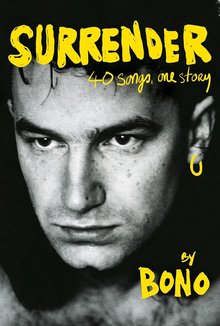Recommended Books
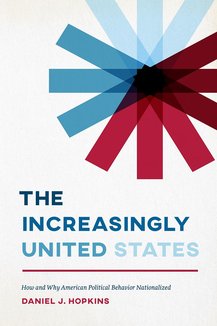
The Increasingly United States: How and Why American Political Behavior Nationalized (Chicago Studies in American Politics)
Author:
Daniel J. Hopkins
ISBN 13:
978-0226530376
In a campaign for state or local office these days, you’re as likely today to hear accusations that an opponent advanced Obamacare or supported Donald Trump as you are to hear about issues affecting the state or local community. This is because American political behavior has become substantially more nationalized. American voters are far more engaged with and knowledgeable about what’s happening in Washington, DC, than in similar messages whether they are in the South, the Northeast, or the Midwest. Gone are the days when all politics was local. With The Increasingly United States , Daniel J. Hopkins explores this trend and its implications for the American political system. The change is significant in part because it works against a key rationale of America’s federalist system, which was built on the assumption that citizens would be more strongly attached to their states and localities. It also has profound implications for how voters are represented. If voters are well informed about state politics, for example, the governor has an incentive to deliver what voters—or at least a pivotal segment of them—want. But if voters are likely to back the same party in gubernatorial as in presidential elections irrespective of the governor’s actions in office, governors may instead come to see their ambitions as tethered more closely to their status in the national party.
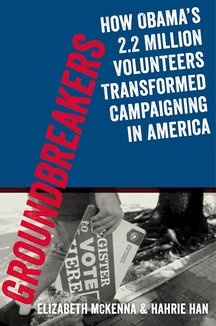
Groundbreakers: How Obama's 2.2 Million Volunteers Transformed Campaigning in America
Authors:
Elizabeth Mckenna
,
Hahrie Han
,
Elizabeth McKenna
,
Jeremy Bird
ISBN 13:
978-0199394609
Much has been written about the historic nature of the Obama campaign. The multi-year, multi-billion dollar operation elected the nation's first black president, raised and spent more money than any other election effort in history, and built the most sophisticated voter targeting technology ever before used on a national campaign. What is missing from most accounts of the campaign is an understanding of how Obama for America recruited, motivated, developed, and managed its formidable army of 2.2 million volunteers. Unlike previous field campaigns that drew their power from staff, consultants, and paid canvassers, the Obama campaign's capacity came from unpaid local citizens who took responsibility for organizing their own neighborhoods months--and even years--in advance of election day. In so doing, Groundbreakers argues, the campaign engaged citizens in the work of practicing democracy. How did they organize so many volunteers to produce so much valuable work for the campaign? This book describes how. Elizabeth McKenna and Hahrie Han argue that the legacy of Obama for America extends beyond big data and micro-targeting; it also reinvigorated and expanded traditional models of field campaigning. Groundbreakers makes the case that the Obama campaign altered traditional ground games by adopting the principles and practices of community organizing. Drawing on in-depth interviews with OFA field staff and volunteers, this book also argues that a key achievement of the OFA's field organizing was its transformative effect on those who were a part of it. Obama the candidate might have inspired volunteers to join the campaign, but it was the fulfilling relationships that volunteers had with other people--and their deep belief that their work mattered for the work of democracy--that kept them active. Groundbreakers documents how the Obama campaign has inspired a new way of running field campaigns, with lessons for national and international political and civic movements.
Find on:
 Amazon
Amazon
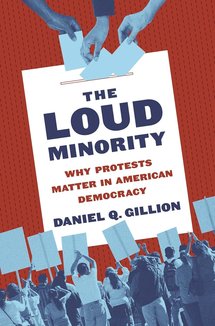
The Loud Minority: Why Protests Matter in American Democracy (Princeton Studies in Political Behavior)
Author:
Professor Daniel Q. Gillion
ISBN 13:
978-0691181776
How political protests and activism influence voters and candidates The “silent majority”―a phrase coined by Richard Nixon in 1969 in response to Vietnam War protests and later used by Donald Trump as a campaign slogan―refers to the supposed wedge that exists between protestors in the street and the voters at home. The Loud Minority upends this view by demonstrating that voters are in fact directly informed and influenced by protest activism. Consequently, as protests grow in America, every facet of the electoral process is touched by this loud minority, benefiting the political party perceived to be the most supportive of the protestors’ messaging. Drawing on historical evidence, statistical data, and detailed interviews about protest activity since the 1960s, Daniel Gillion shows that electoral districts with protest activity are more likely to see increased voter turnout at the polls. Surprisingly, protest activities are also moneymaking endeavors for electoral politics, as voters donate more to political candidates who share the ideological leanings of activists. Finally, protests are a signal of political problems, encouraging experienced political challengers to run for office and hurting incumbents’ chances of winning reelection. The silent majority may not speak by protesting themselves, but they clearly gesture for social change with their votes. An exploration of how protests affect voter behavior and warn of future electoral changes, The Loud Minority looks at the many ways that activism can shape democracy.
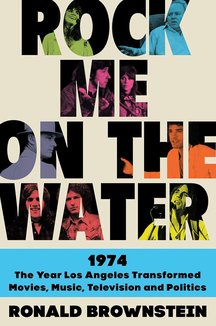
Rock Me on the Water: 1974--the Year Los Angeles Transformed Movies, Music, Television and Politics
Author:
Ronald Brownstein
ISBN 13:
978-0062899224
"An electric story filled with gripping personalities, compelling backstage histories, and a clear message for the divided America of today: the forces that fear change can win for a time, but in America the future always gets the last word. A lyrical recreation of a magical moment.”—Jake Tapper Now in paperback, an exceptional cultural history from Atlantic Senior Editor Ronald Brownstein—“one of America's best political journalists” ( The Economist )—tells the kaleidoscopic story of one monumental year that marked the city of Los Angeles’ creative peak, a glittering moment when popular culture was ahead of politics in predicting what America would become. Los Angeles in 1974 exerted more influence over popular culture than any other city in America. Los Angeles that year, in fact, dominated popular culture more than it ever had before, or would again. Working in film, recording, and television studios around Sunset Boulevard, living in Brentwood and Beverly Hills or amid the flickering lights of the Hollywood Hills, a cluster of transformative talents produced an explosion in popular culture which reflected the demographic, social, and cultural realities of a changing America. At a time when Richard Nixon won two presidential elections with a message of backlash against the social changes unleashed by the sixties, popular culture was ahead of politics in predicting what America would become. The early 1970s in Los Angeles was the time and the place where conservatives definitively lost the battle to control popular culture. Rock Me on the Water traces the confluence of movies, music, television, and politics in Los Angeles month by month through that transformative, magical year. Ronald Brownstein reveals how 1974 represented a confrontation between a massive younger generation intent on change, and a political order rooted in the status quo. Today, we are again witnessing a generational cultural divide. Brownstein shows how the voices resistant to change may win the political battle for a time, but they cannot hold back the future.
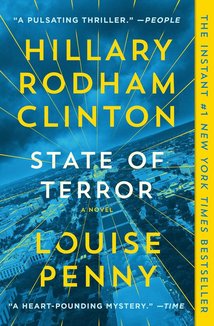
State of Terror: A Novel
Authors:
Louise Penny
,
Hillary Rodham Clinton
ISBN 13:
978-1982173685
AN INSTANT #1 NEW YORK TIMES BESTSELLER Named one of the most anticipated novels of the season by People , Associated Press, Time , Los Angeles Times , Parade , St. Louis Post-Dispatch , The Guardian , Publishers Weekly , and more. From the #1 bestselling authors Hillary Clinton and Louise Penny comes a novel of unsurpassed thrills and incomparable insider expertise— State of Terror . After a tumultuous period in American politics, a new administration has just been sworn in, and to everyone’s surprise the president chooses a political enemy for the vital position of secretary of state. There is no love lost between the president of the United States and Ellen Adams, his new secretary of state. But it’s a canny move on the part of the president. With this appointment, he silences one of his harshest critics, since taking the job means Adams must step down as head of her multinational media conglomerate. As the new president addresses Congress for the first time, with Secretary Adams in attendance, Anahita Dahir, a young foreign service officer (FSO) on the Pakistan desk at the State Department, receives a baffling text from an anonymous source. Too late, she realizes the message was a hastily coded warning. What begins as a series of apparent terrorist attacks is revealed to be the beginning of an international chess game involving the volatile and Byzantine politics of Pakistan, Afghanistan, and Iran; the race to develop nuclear weapons in the region; the Russian mob; a burgeoning rogue terrorist organization; and an American government set back on its heels in the international arena. As the horrifying scale of the threat becomes clear, Secretary Adams and her team realize it has been carefully planned to take advantage of four years of an American government out of touch with international affairs, out of practice with diplomacy, and out of power in the places where it counts the most. To defeat such an intricate, carefully constructed conspiracy, it will take the skills of a unique team: a passionate young FSO; a dedicated journalist; and a smart, determined, but as yet untested new secretary of state. State of Terror is a unique and utterly compelling international thriller cowritten by Hillary Rodham Clinton, the 67th secretary of state, and Louise Penny, a multiple award-winning #1 New York Times bestselling novelist.
